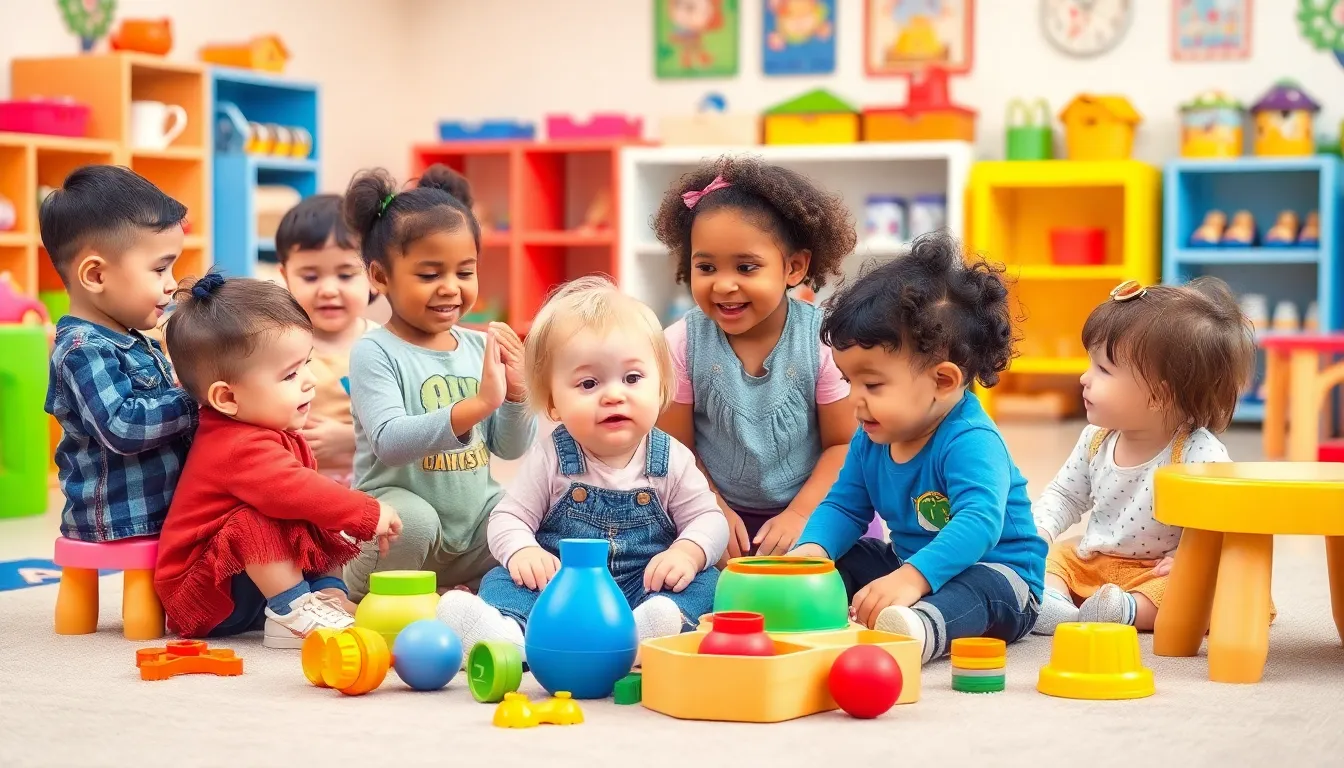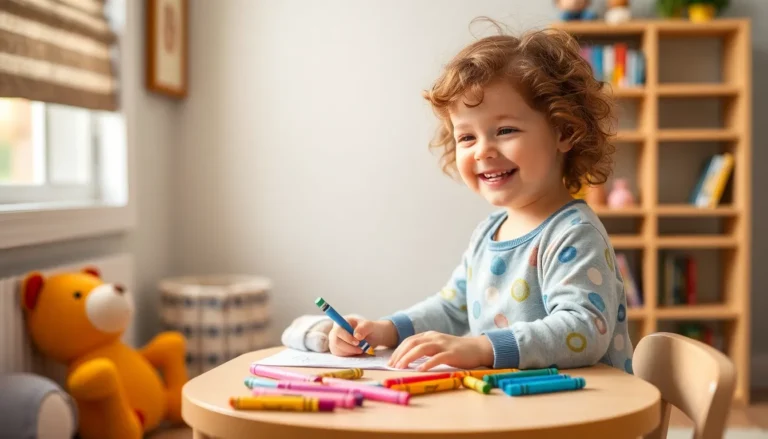Table of Contents
ToggleFinding the right daycare for toddlers can feel like searching for a needle in a haystack, except the haystack is made of tiny toys and the needle is your sanity. Parents want a place where their little ones can learn, play, and make friends while they enjoy a much-needed coffee break—without worrying about whether their child is being cared for by someone who thinks “nap time” means a Netflix binge.
Overview of Toddler Daycare
Toddler daycare serves as a critical resource for working parents, providing structured care for children aged 1 to 3 years. Quality daycare programs prioritize safety, nurturing environments, and age-appropriate educational activities tailored to promote cognitive and social development. Certified staff members facilitate engaging experiences that enhance language skills and encourage creativity.
Children benefit from social interaction with peers. Daycare fosters friendships, teaching toddlers essential social skills such as sharing and communication. Engaging in group activities prepares children for future classroom settings, enabling smoother transitions into preschool.
Safety is paramount in toddler daycare settings. Secure facilities, background-checked staff, and childproof toys reinforce a secure environment. Regular health checks and routines help maintain hygiene, alleviating parental concerns about illness.
Programs often include structured schedules to guide daily activities. Time is allocated for play, learning, meals, and rest. Such organization helps toddlers develop a sense of routine, which is crucial for their emotional security.
Additionally, many daycare centers incorporate parents into their programs. Daily reports, parent-teacher conferences, and feedback opportunities keep families informed about their child’s progress and experiences. This collaboration aids in creating a supportive community around the child’s growth.
Toddler daycare provides parents with peace of mind while enriching children’s lives with essential developmental experiences and social interactions.
Benefits of Toddler Daycare

Toddler daycare offers numerous advantages for both children and parents. Structured environments promote essential skills while providing a safe space for growth.
Socialization Opportunities
Social interactions form a crucial part of toddler daycare. Children engage with their peers, developing sharing skills, cooperation, and effective communication. Group activities foster a sense of community, encouraging friendships to blossom. Such environments also expose toddlers to diverse backgrounds, enhancing their understanding and acceptance of others. Frequent playtime promotes teamwork, which is vital for social competence. As a result, children often become more confident in group settings.
Cognitive Development
Cognitive growth thrives in quality toddler daycare programs. Educational activities tailored to toddlers stimulate curiosity and problem-solving abilities. Engaging materials and age-appropriate tasks encourage exploration and creativity. Structured routines introduce fundamental concepts, like numbers and letters, laying a foundation for future learning. Trained staff guides these experiences, ensuring each child receives the support they need. Daily routines contribute significantly to mental well-being, helping children adjust and thrive in new situations. Overall, daycare settings play an essential role in nurturing cognitive development during these formative years.
Choosing the Right Toddler Daycare
Finding the right toddler daycare requires careful consideration of various factors that influence a child’s experience and development.
Factors to Consider
Safety tops the list of priorities when selecting a daycare. Parents should ensure facilities maintain secure environments with background-checked staff and proper hygiene practices. Quality of education ranks high as well; programs should offer age-appropriate activities promoting cognitive and social development. Observe interactions among staff and children, as positive engagement typically fosters a nurturing atmosphere. Explore whether daily schedules include structured activities that help toddlers develop emotional security through routine. Lastly, check for parent involvement opportunities that encourage community support around a child’s growth.
Questions to Ask Potential Daycares
Inquire about safety protocols, including how emergencies are handled. Ask about the staff’s qualifications and training, focusing on their experience with toddlers. Explore the daily schedule to understand how structured activities and free play are balanced. Find out about the communication methods used to keep parents informed, such as reports or feedback sessions. Investigate the daycare’s approach to managing behaviors and conflicts among children, as this reflects its commitment to social development.
Daily Activities in Toddler Daycare
Daily activities in toddler daycare focus on promoting cognitive and social development. Structured schedules guide these activities, providing children with a sense of routine and emotional security. Learning through play is a core element, allowing toddlers to explore their environment while developing essential skills.
Morning circle time often begins the day, fostering language development and social interaction. Children engage in songs, storytelling, and discussions, which enhance their listening skills and vocabulary. Activities follow a similar pattern each day, reinforcing predictability and comfort.
Creative play occupies a significant part of the day. Art projects, building blocks, and imaginative play areas allow toddlers to express themselves and explore their creativity. These activities stimulate fine motor skills and encourage problem-solving, laying the groundwork for future learning.
Outdoor playtime also forms a vital component. Periods spent outside boost physical development, promoting gross motor skills through running, climbing, and exploring nature. Social skills flourish as toddlers play together, practicing sharing and cooperation.
Snack and meal times are designed to teach self-regulation and social manners. Shared meals encourage conversation and camaraderie, reinforcing community values. Staff members guide these interactions to ensure positive experiences and model appropriate behavior.
Quiet time provides essential rest, allowing children to recharge. Nap routines help establish a sense of security, contributing to overall well-being. Structured rest periods ease the transition between activities, supporting emotional and cognitive development.
Engagement with caregivers remains ongoing throughout the day. Regular interactions with trained staff foster trust and guide each child’s learning journey. Feedback opportunities keep parents connected, offering insights into daily experiences and developmental progress.
Potential Challenges of Toddler Daycare
Finding the right toddler daycare involves navigating several potential challenges. Parents may experience separation anxiety as their children adapt to new caregivers and environments. Managing this transition can be difficult for both toddlers and parents, leading to emotional stress.
Additional challenges include maintaining consistency in routines. Daycare settings might differ in structure, which can disrupt a child’s sense of security. Adapting to new schedules can create confusion, especially during early morning drop-offs.
Another significant concern is the risk of illness. In group settings, toddlers are more susceptible to infections as they share toys and spaces. Regular health checks help, but exposure to germs remains a reality.
Communication barriers can also pose difficulties. Direct access to caregivers may be limited, leaving parents uncertain about their child’s daily experiences. Regular communication practices, such as daily reports or digital updates, can mitigate this issue.
Behavioral management expectations vary between home and daycare. Toddlers may struggle to adapt to different disciplinary approaches, leading to inconsistency in responses. Caregivers must align with parents on strategies to foster desirable behavior.
Transportation challenges can arise, particularly if daycare is not located near home or work. Daily commutes impact schedules and can affect family dynamics. Planning ahead can help in addressing these logistical concerns.
Finally, cost remains a crucial factor. The expense of quality daycare can strain family budgets, leading parents to prioritize their needs. Researching and comparing options ensures families find affordable solutions without compromising safety or care quality.
These challenges underscore the importance of thorough research and open communication when selecting a suitable daycare for toddlers.
Finding the right toddler daycare is a vital step for parents aiming to provide their children with a nurturing and enriching environment. Quality daycare not only ensures safety but also promotes essential cognitive and social skills through structured activities and peer interactions. Parents can take comfort in knowing that their toddlers are engaged in a supportive atmosphere that fosters growth and development.
By carefully considering factors such as safety protocols, staff qualifications, and daily routines, parents can make informed choices that align with their child’s needs. Open communication with caregivers further enhances the daycare experience, creating a collaborative approach to each child’s journey. Ultimately, a well-chosen daycare can significantly impact a toddler’s early years, setting a strong foundation for future learning and socialization.







